|
Leading with Quality, Performance and Cost
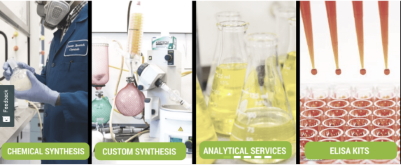 Our partner, the
Toronto Research Chemicals(TRC) is a global leader for the Reagents,
Building Blocks, Research Tools, and Standards.
Our partner, the
Toronto Research Chemicals(TRC) is a global leader for the Reagents,
Building Blocks, Research Tools, and Standards.
Toronto Research Chemicals (TRC) has for 38 years specialised in the production
of high-quality products for innovative research. With a catalogue of 300,000+
research products and state-of-the-art analytical facilities, TRC’s goal is to
provide the tools and support required by researchers in the global scientific
community. TRC’s catalogue showcases a wide range of products, including
analytical standards, natural products, APIs, impurities & metabolites and more
than 18,000+ stable labelled standards. These products are used in numerous
applications, including forensic science, environmental analysis, and
pharmaceutical and medicinal R&D !
We regularly prepare stock or synthesis by request the following branches of
materials:
- Specialized in providing high quality bio-chemicals in custom pack sizes to
satisfy any quantity required. Distribute to companies worldwide, usually,
providing overnight delivery in North America via Federal Express.
- We also offer alternative carrier options to meet worldwide delivery and special
import requirements as well as dangerous goods.
- A dedicated professional customer service team positioned to ensure customer
satisfaction and technical suppor
t.
Our Synthetic Service includes most categories of
customized compounds, and today, Toronto Research Chemicals Inc. employs more than
300 full time staff, of which approximately 200 are PhD’s and MSc’s, operating
in 120,000 square feet of facilities, including 15 production laboratories, in
Toronto, Canada.
Search Products By Category
..
Coronavirus COVID-19 (SARS-CoV-2) Research Products
|
Featured Products
19 Results
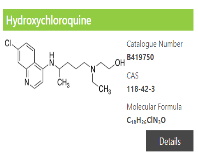
|
In the face of the COVID-19 pandemic many health organizations and research institutions are scrambling to learn more about the virus as well as find vital therapies to combat its spread. At TRC, we offer several featured products that are aimed to provide researchers with the best tools for their COVID-19 research. Whether your research is focused on slowing the infection via targeting viral replication or combat the virus by gaining insights on potential repurposed treatments—we have all the tools needed for your cutting edge COVID-19 research. Fusion Inhibitors, also known as entry inhibitors, are a class of antiretroviral (ARV) drugs. This class of antiviral drugs is used primarily in the treatment of HIV. As the name implies these inhibitors prevent viruses from entering or “fusing” with the host cells. Fusion inhibitors bind to envelope proteins on the exterior of the virus, effectively preventing the structural changes necessary to infuse with the host cell. Without the ability
to enter the host cells the virus no longer have access to the machinery required to replicate and grow.
|
|
Virus-Host Fusion Inhibitors
123 Results
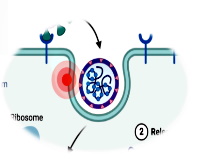
|
Fusion Inhibitors, also known as entry inhibitors, are a class of antiretroviral (ARV) drugs. This class of antiviral drugs is used primarily in the treatment of HIV. As the name implies these inhibitors prevent viruses from entering or “fusing” with the host cells. Fusion inhibitors bind to envelope proteins on the exterior of the virus, effectively preventing the structural changes necessary to infuse with the host cell. Without the ability to enter the host cells the virus no longer have access to the machinery required to replicate and grow. Discover our complete range of inhibitors and modulators along with building blocks, metabolites, impurities and labelled isotopes.
|
|
Protease Inhibitors
55 Results
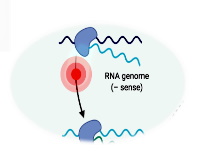
|
Protease Inhibitors are a class of antivirals drugs used to treat a variety of viral infections, in particular HIV and HCV. These groups of inhibitors act by selectively binding to viral proteases during viral replication. In turn, preventing the proteolytic cleavage of protein precursors necessary to produce infectious viral particles. As a result, these newly replicated viruses are defective and unable to replicate and infect more host cells. Discover our complete range of inhibitors and modulators along with building blocks, metabolites, impurities and labelled isotopes.
|
|
RdRp Inhibitors
80 Results
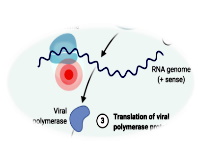
|
RNA-dependent RNA polymerase Inhibitors or RdRp inhibitors for short are a class of antiviral drugs. These inhibitors act to block the function of viral enzyme RNA-dependent RNA polymerase. RdRp is an essential enzyme used by viruses to replicate their genetic material and initiate viral replication. Once the enzyme is inhibited, viral replication is stopped, and the virus can no longer grow and infect more host cells. Discover our complete range of inhibitors and modulators along with building
blocks, metabolites, impurities and labelled isotopes.
|
|
Bromodomain Inhibitors
35 Results
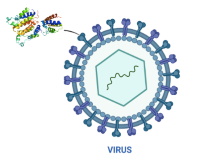
|
Bromodomain Inhibitors are a class of antiviral drugs commonly used in the treatment of HIV. These molecules bind to regions of proteins known as bromodomains— which bind acetylated lysines in histone tails. Proteins that contain bromodomains are also epigenetic regulators, which play an important role in gene expression and regulation. This class of inhibitors blocks these protein interactions and in turn prevents viral replication within the host cell. Discover our complete range of inhibitors and modulators along with building blocks, metabolites, impurities and labelled isotopes.
|
|
Antivirals
996 Results
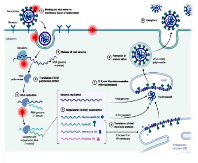
|
Antiviral drugs are a class of medication used specifically for treating viral infections. Most antivirals are used for specific viral infections, while some are effective against a wide spectrum of viruses. Antiviral medications are not designed to destroy their target pathogen but instead inhibit a particular phase of viral replication. This could include stages, such as the attachment to a host cell, replication of viral components or the release of infectious viral particles. Discover our complete range of inhibitors and modulators along with building blocks, metabolites, impurities and labelled isotopes. |
|